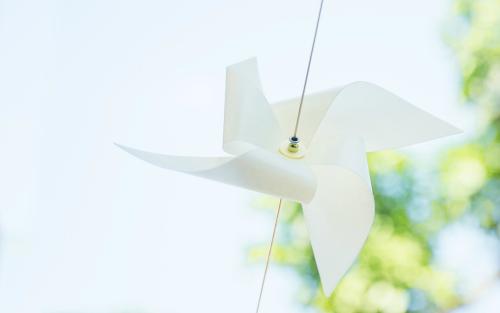做你自己
Do something for yourself
As a little boy, there was nothing I liked better
than Sunday aftemoons
at my grandfather's farm in western Pennsylvania.
我小時(shí)候最喜歡在爺爺?shù)霓r(nóng)場(chǎng)里度過每個(gè)星期天的下午。
爺爺?shù)霓r(nóng)場(chǎng)在賓夕法尼亞州西部。
Surrounded by miles of winding stonewalls,
the house and barn provided endless hours of fun
for a city kid like me.
農(nóng)場(chǎng)四周都圍上了綿延幾英里的石墻。
房子和谷倉給我這個(gè)城市男孩帶來了無窮的快樂時(shí)光。
I was used to parlors neat as a pin
that seemed to whisper, 'Not to be touched!'
我習(xí)慣了城里整潔的客廳
似乎在低聲說:“不要摸!”。
I can still remember one afternoon
when I was eight years old.
Since my first visit to the farm,
I'd wanted more than anything to be allowed
to climb the stonewalls
surrounding the property.
我仍能記得我8歲那年一天下午的情景,
因?yàn)槲业谝淮稳マr(nóng)場(chǎng)。
所以我很想上那農(nóng)場(chǎng)四周的那些石墻。
My parents would never approve.
The walls were old,
some stones were missing,
others loose and crumbling.
可我的父母是絕不會(huì)同意的,
這些墻年深日,
有的石頭不見了,
有的石頭松動(dòng)倒塌了。
Still, my yearning to scramble across
those walls grew so strong.
然而,我渴望這些墻的欲望非常強(qiáng)烈。
One spring afternoon,
I summoned all my courage
and entered the living room,
where the adults had gathered after dinner.
一個(gè)春天的下午,
我鼓足勇氣,走進(jìn)客廳,
大人們午飯后都聚在這里。

'I, uh, I want to climb the stonewalls,'
I said hesitantly.
“我,呃,我想爬那些石墻,”
我猶豫地說道。
Everyone looked up.
'Can I climb the stonewalls?'
大家都抬起頭。
“我能去爬那些石墻嗎?”
Instantly a chorus went up from the women in the room.
'Heavens, no!' they cried in dismay.
'You'll hurt yourself!'
屋里的女人們馬上齊聲叫了起來,
“天哪,不能!”她們驚慌地叫著,
“你會(huì)傷著自己的!”
I wasn't too disappointed
the response was just as I'd expected.
我并沒有太失望,我早就預(yù)料會(huì)是這樣的回答。
But before I could leave the room,
I was stopped by my grandfather' s booming voice.
但還沒等我離開客廳,
爺爺?shù)统恋穆曇魯r住了我
'Hold on just a minute,'
I heard him say,
'Let the boy climb the stonewalls.
He has to learn to do things for himself.'
“等一會(huì)兒,”
我聽到他說,
“讓孩子爬那些石墻吧。他必須學(xué)會(huì)自己做一些事。”
'Scoot,' he said to me with a wink,
'and come and see me when you get back.'
“快走吧,”他對(duì)我眨眨眼說。
“你回來后找我。”
For the next two and a half hours
I climbed those old walls and had the time of my life.
接下來的兩個(gè)半小時(shí),
我爬上了這些古老的石墻,別提有多開心。
Later I met with my grandfather
to tell him about my adventure.
I'll never forget what he said.
后來,我把自己冒險(xiǎn)經(jīng)歷告訴了爺爺。
我永遠(yuǎn)也不會(huì)忘記他說過的話。
'Fred,' he said, grinning,
“弗雷德,”他咧著嘴笑道。
'you made this day a special day just by being yourself.
Always remember,
there's only one person in this whole world like you,
and I like you exactly as you are.'
“你做了一回自己,
你讓這個(gè)日子因此而變得不同凡響。
永遠(yuǎn)記住,整個(gè)世界只有一個(gè)你,
而且我喜歡真實(shí)的你。”
Many years have passed since then,
and today I host the television program
Mister Rogers' Neighborhood,
seen by millions of children throughout America.
許多年過去了,
現(xiàn)在我主持的電視節(jié)目《羅杰斯先生的街坊四鄰》,
全美國幾百萬兒童都會(huì)收看。
There have been changes over the years,
but one thing remains the same:
幾年過后,節(jié)目已經(jīng)發(fā)生了一些變化,但有一點(diǎn)沒變:
my message to children at the end of almost every visit,
'There's only one person in this whole world like you,
and people can like you exactly as you are.'
幾乎每期節(jié)日后我都會(huì)傳遞給孩子這樣一個(gè)信息,
“這個(gè)世界上只有一個(gè)你,
人們都喜歡真實(shí)的你。”
微信公眾號(hào):英語美文朗讀 孟叔的微博:孟飛Phoenix 孟叔的抖音:184302945











